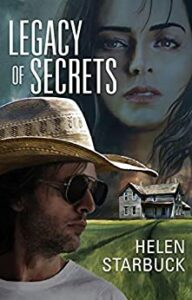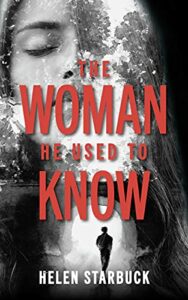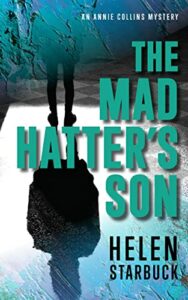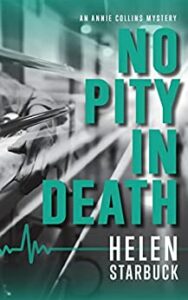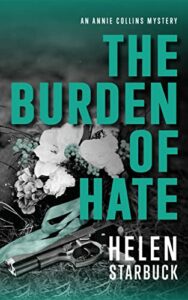Writing Strong Relationships: An Interview with Helen Starbuck
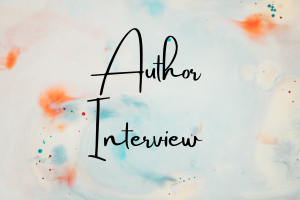
Author Helen Starbuck and I would have a lot to chat about in real life. She’s a former operating room nurse, she likes cats, she writes about strong women, and her theory is, “If you don’t like life as it is, you can always write a different ending.” If those don’t align with my interests, then I don’t know what does! So I was thrilled when she said she’d love to participate in my author interview series, and I can’t wait for you to read her answers. Helen is an award-winning author with six novels to her name (and more to come). She writes mainly romantic suspense (take note, all my writer friends who want to head in that direction!), and her readers love her work! One reader said, “A book that draws you and doesn’t want to let you go. A well-written adventure with plenty of twists and turns,” and another wrote, “The characters were well flushed out, the writing clean and tight, which is a big bonus, and the descriptions took me there.” A big round of thanks to Helen for providing such thoughtful responses to my questions.
Christina: You’re the author of six novels and counting. How did you go from being an OR nurse to writing? Will all your books have a medical theme or component to them? Is there anything from that field that you would not feel comfortable writing?
Helen: There is a strong medical theme throughout my Annie Collins Mystery Series, Annie is an OR nurse, so it works its way into those books. However, the series is not always focused on in-hospital plots. My other books don’t have this component, other than more realistic portrayals of injuries or conditions.
I’m an OR nurse, like Annie, although I don’t practice these days, so I feel very comfortable with this field. If what I am writing about is not within my field of nursing, then I always consult with someone who works in that specialty so I get it right. I’m always annoyed when a character in another book or TV or movie sustains a serious injury and then in the next moment acts normal. I don’t dwell on the consequences but I do have my characters portray a more realistic outcome.
Christina: You say on your website that you like “stories about strong women and interesting men.” What, in your opinion, makes a strong woman and an interesting man?
Helen: Strong women, in my opinion, are intelligent, resourceful women who weather difficult times or situations and find solutions. They’re women who have a strong sense of right and wrong, who stand up for friends and loved ones, and will pursue answers, even at their own risk, to set things right. My characters don’t have to be martial arts experts, but they do fight back in many ways when necessary.
Strong men are similar. They’re good men who may have issues that can create conflict (PTSD, frustration with the female character) or make them a bit quirky, but at heart, they’re loyal, intelligent, protective, and have a good sense of right and wrong. In their professional life (e.g., lawyers, cops, artists, veterans, and writers), they fight the good fight and in their personal life, they support the people they care about.
I don’t write men who are rude, borderline abusive, or manipulative with the people in their lives—unless they’re a villain. My male characters are witty and faithful. They can be provocative and frustrating at times, but they’re relatable and appealing. They’re the kind of men I like and, apparently, so do my readers.
Christina: Your novels are categorized as romantic suspense and mystery. Do you approach writing these genres differently? Aside from your nursing experience, from where else do you draw inspiration?
Helen: All my books have mystery or suspense themes and a little romance, but romance plays a more central role in the romantic suspense books. It can be the driving force behind solving the problem or situation. Legacy of Secrets, for example, is about family secrets and a daughter’s search for answers to who her father really was. In the process, she meets a man who knew her father in a way she never did. There is a strong attraction between them and he helps her find those answers with the backdrop of a budding relationship between them.
In my mystery series, the romance is less in the forefront and takes longer to develop as the series progresses. I like mystery series even if they don’t have a love relationship. What I have found is, even in those books there is a strong relationship with a partner or a friend who helps the main character solve the mystery. I just prefer there be some romance.
I draw inspiration from many sources other than my nursing experience. I listen to conversations I overhear in public—and I have heard some great ones that have sparked plot ideas. Music plays a role as well. Songs will often spark the idea for a scene or a plot. For example, John Mayer’s “Slow Dancing in a Burning Room,” inspired the conflicted and difficult relationship between the main characters in The Woman He Used to Know.
My physical surroundings also play a part. I often drive to Boulder on Highway 93, which runs along what is known as the Hogback. It’s a peculiar rock formation that has a sharp spine that looks like a Stegosaurus to me. Driving by that section of highway at night, inspired the start of Finding Alex, and is the spot where Alex manages to stumble out on the highway and Detective Blake Halloran nearly hits her with his car.
Christina: Readers love your work, calling it both “intriguing” and “gripping,” and they appreciate the twists and turns. How do you find the balance between giving your reader enough to enjoy the story but not revealing everything?
Helen: That’s hard work, and it took me a while to figure out how to do that. The first book in my mystery series, The Mad Hatter’s Son has been described as a ‘how done it,’ rather than a ‘who done it.’ And it is. In that book, mystery readers usually figure out who the villain is, the question is, how was the murder accomplished and why?
To keep the villain difficult to figure out takes work. I usually know who the culprit is, then I figure out how to write it so that he or she seems to be an unlikely suspect or throw suspicion on other characters. I give hints along the way, but they have to be subtle to surprise the reader. I want the protagonist to be surprised as well until the very last when they put the clues together, just like the reader. I think that’s the fun of reading mystery or suspense books. I am often surprised and marvel at the way the author has led me astray.

Christina: Three of your books are part of the Annie Collins mystery series. Did the idea of writing a series arise organically? What sorts of obstacles do you need to overcome when writing a series?
Helen: I didn’t intend to write a series, but at the end of book one The Mad Hatter’s Son, I loved the characters so much and felt there was more to discover about them, so I wrote book two. Book three was the natural culmination of a problem that had been brewing since book one.
Mystery series can be hard to sustain. For example, after book two, No Pity In Death, I had to find a way to get Annie and the mystery out of the hospital. Mysterious deaths in a hospital that Annie is involved in can only occur so often before it becomes tedious and unbelievable.
You have to develop the characters in a logical way—with conflicts and detours of course—over a prolonged period of time and create fresh plots. That worked well until after book three, The Burden of Hate. At that point my characters stopped talking to me, and I struggled for nearly four years to come up with a new plot. That’s how the standalone romantic suspense books came to be. Those plots were coming fast and furious, so I stopped worrying about the series and wrote the standalones instead.
I went through four ideas for book four before landing on one that flowed in a logical direction. I joke that I put my characters through so much hell in The Burden of Hate that they were done with me. I seriously wondered whether book three would be the last in the series, but with time a plot came to me, and the series is back on track.
Christina: Titles and how authors choose titles is something that interests me. I love the titles of your books! How do you choose the title? Where in the writing process does the title arrive? Have you ever changed a title?
Helen: Trying to come up with a title that works makes my head explode. The search for a title usually happens after the book is written and it is with my editor. I start with a place holder title while writing the story, but that rarely ends up being the published title. The exception was Finding Alex. That fit, had some mystery to it, and I never changed it.
The other books go through many titles and I often have a ‘title barf’ (her term) with my publishing consultant where we write down as many possible titles as we can think of based on the plot and finally choose one. The Mad Hatter’s Son was suggested to me by a friend and is based on a character’s misunderstanding of a name.
Christina: Covers also interest me, though I’m no designer. You recently updated the covers for your mystery series. What prompted you to change the covers? What do you look for in an excellent book cover? Do you have a designer’s eye, or do you rely on someone else?
Helen: The saying “don’t judge a book by its cover” is perhaps the most incorrect advice I’ve heard. People do judge them and a cover is often what makes a person pick a book off the shelf, so they are crucial. A cover has to align with the genre you are writing or it fools the reader and disappoints them, which is not what you want. For example, you wouldn’t use a typical cozy mystery cover for a hard-boiled, police procedural novel.
Genre covers change overtime as readers’ tastes and styles change. My mystery series spans five years from when the first book was published and the third in the series came out. It’s recommended that you review your covers every five years to see if they still align with your genre. Mine had become outdated in that respect (although I still love them). I realized if I changed the first one, I would have to change all of them, so I have. The new covers have a similar feeling for a mystery series and feedback from my newsletter subscribers who got the first reveal indicate they like them.
I look for a cover that helps to portray what the novel is about without giving away too much. I have used graphic artists for my covers because I have a sense of what I want, based on my stories, but I don’t have the skill to create a cover. The two designers I have used are very creative and often come up with multiple possibilities for a book’s cover that I can choose from. Once I pick one, we refine it until it becomes the published cover. Having been involved in this process six times, I wouldn’t recommend an author creating a cover themselves, unless they are artists or graphic designers. Indie books have to compete with traditionally published books, and they have to measure up.
Christina: Pets and writers seem to go together, and I’m so interested in your cat, Bean. Is Bean your only animal? Does he inform your writing at all? What have you learned from him, and how did he get his name?
Helen: I also own a pampered, 23-year-old, pasture-pet quarter horse named Jesse. He is helping kids learn to ride and enjoying his retirement from more strenuous activities—arthritis gets us all.
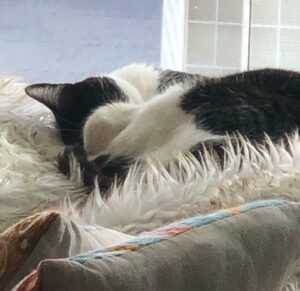
Bean is a pill. He got his name because he’s on the small side and I had read a book to my daughter when she was young whose title was Little Bean Goes to the Seashore. Bean seemed appropriate. I adopted him from a shelter and was told he had been adopted out twice and returned. I think it’s because he’s a talker and very curious. He gets into everything, has to be involved in everything, and is a one-person cat. That person is me, and he chose me at the shelter. I opened the cage he was in and he climbed into my arms and began purring. That hasn’t changed. I am his, and he’s really not interested in anyone else.
He ‘helps’ me write by sitting in my lap and generally getting in the way. I think in his last life, he must have been a writer, he even has the pose—he rests his hands on the desk, as if he’s using the keyboard. He’s taught me to appreciate being inquisitive and being willing to explore, which is helpful for a writer. He also provides a lot of unconditional love (assuming I feed him regularly), which is vital to us all.
Helen can be found in multiple places!
Website: https://helenstarbuck.com/
Instagram: @helenstarbuck_author
Facebook: @helensstarbuck
Twitter: @HelenSStarbuck
Thanks to Helen for agreeing to this interview! If you know of an artist, author, or podcaster who’d like to be featured in an interview (or you are an author who would like to be featured), feel free to leave a comment or email me via my contact page.

